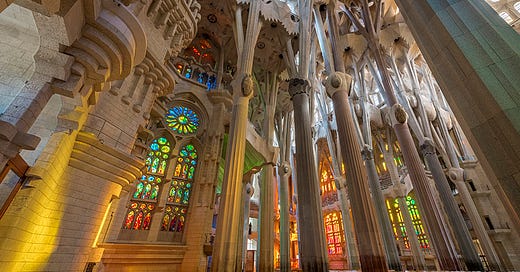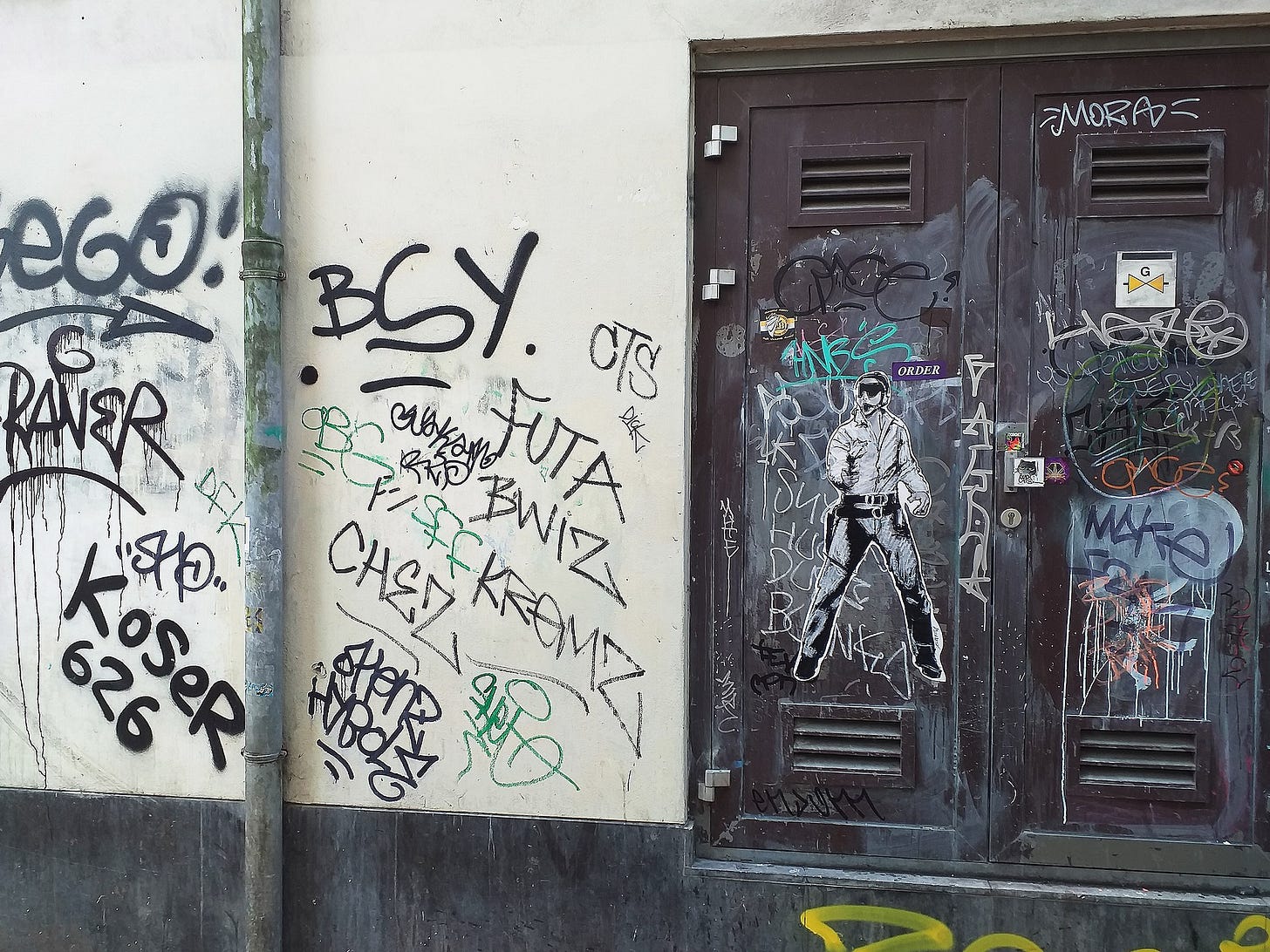Category: sharing in public, reflections on stoicism, superiority complex, mission and augmented reality.
I’m travelling by train. The landscapes outside the window are beautiful for the most part, forests and sweeping landscapes. Once in a while, I pass something I deem ugly: browned fields, new-ish buildings. I recall my departure from Stockholm Central. Not a pretty place.
What makes something beautiful? If I put on my Stoicism glasses1, the answer is simple: “Beauty is a value judgement”2. In this view, beauty and ugliness are reactions to things we perceive, not a characteristic of things in themselves.3 When I was in the central station, I actually did try to shift my attitude towards it. I tried going into appreciation for the awesome feat a national railway system is, and how it connects me with people I care about. It was still pretty ugly, but I could appreciate it more.
Let’s turn the question around, and ask ourselves: “What makes things ugly?”. Or, with a more positive spin: “What keeps me from appreciating things?”. Again, the stoic perspective is based on value judgements. I have been trained4 to think of some sounds as noisy and some imagery as ugly. Grafitti, crying children, advertisements, and dirty concrete.5
I could try to change my mind to fit the reality I’m in and learn to appreciate these impressions. Practice meditating in busy shopping areas.6 Go into loving kindness meditation7 towards noisy people on the bus.8 Read up on graffiti culture, learning to appreciate the hard work and dedication that goes into keeping an area properly tagged.
While interesting in theory, solving all my problems using inner work seems a bit too hardcore. I’ve heard some people claim that suffering is everywhere, and only meditation can set one free.9 A part of me is attracted by this attitude, it seems pure and grand. I think my attraction is rooted in a wish to be special, treating enlightenment as a grand mission fit for my hero’s journey. Striving towards enlightenment as a status trick seems a bit backward, and might be the reason I’ve struggled to increase my ability to focus for longer periods of time. It’s very easy to get caught up in status games unintentionally.
Also, if I held this opinion, I would be a hypocrite. In practice, I try to reduce unpleasantness, making my living area nice to be in and reducing the amount of noise and ugliness I encounter. I find it much easier to be mindful and happy on the bus if I wear my noise-cancelling headphones. If I don’t, I easily go into stress, reaching for addictive apps or other means of distraction.
Using my headphones, I’ve created a small sound bubble where it’s easier to be the kind of person I want to be. This is similar to retreats and similar, places where people gather to intentionally create a vibe conducive to human flourishing. These places can be seen as a kind of social bubble, just like the headphones provide a sound bubble.10
I am actually on my way to such a social bubble, which is why I’m riding the train. A piece of graffiti just passed by the window, sprayed on a cliff at the edge of a beautiful forest.11 Since I haven’t learned to appreciate graffiti yet, this made me wince a bit. My headphones work great for sounds, but unless I escape to the countryside, I have a fair bit of visual pollution to handle.12
This makes me think of augmented reality glasses, similar to Google glasses but good. In the future, will we get ugly-cancelling glasses?13 Prettify the world, removing ads and graffiti? Maybe make walls smoother and remove dirt? Could we transform Stockholm Central into a masterpiece of art nouveau architecture, looking like Gaudi hand-crafted it himself?
A part of me doesn’t like the idea. It brings to mind a book series I’m reading, called Terra Ignota. In the books, there is a group of people called the Utopians. The Utopians wear augmented reality headsets most of the time. Contrary to my rose-tinted glasses on steroids,14 the Utopians’ glasses highlight everything that needs to be improved.
“Look there, a spot on the wall!” - your friendly augmented reality infinite todo list
The world would be better if everyone was a Utopian. Part of me wants to act like one, dedicating my life to the betterment of the world.15 Again, I want to look at my motivation here. Wanting to dedicate my life to improving the world sounds like a Grand Mission. It is likely attractive for much the same reason I feel a pull toward Enlightenment. Prestige-seeking again :)
How come I go to these extremes? First I feel called to solve everything by “mastering mindfulness”. Now I feel called to solve everything by “fixing the world”.16 When I write these ideas out, they seem absurd. Yet, they hold some emotional appeal.
I want to find a balance here. I want to create a stable foundation by changing my environment to make it easier to attain peace of mind, gradually training myself until I am able to meditate while sitting in a busy shopping district. Meanwhile, I want to engage with the world, doing things that feel alive, while also contributing to others.
And most importantly, I want to stop pressuring myself towards extreme ideals. Being less hard on myself will hopefully make me less judgemental, making it easier to relate and collaborate with others. Getting support in doing practically useful things, instead of getting swept away by pretty narratives promising Grand Missions.
I’ll go enjoy the summer now, take care. :)
Stoicim glasses = think about the question using perspectives from Stoicism, a philosophical school.
Value judgement = a reaction to something we experience, where we judge the thing. If we experience rain and think “MEH!”, we have judged the rain as bad. This judgement is a value judgement. More here.
I’m growing sceptical of thinking of things as either subjective or objective. These are fuzzy ideas, easy to use in unexamined ways. Moving “beauty” into the observer creates a distance to the thing perceived. This distance might have emotional consequences, leading to a sense of disconnect and/or nihilism. I think it’s possible to engage with beauty in a personal and connected way, instead of holding back and looking at it from a distance.
Just to be clear, I do think there’s room for analysis in this relationship, where knowledge of biology can enhance the connectedness to a pretty flower. I’m not advocating pure romanticism here.
Space for discussions on nature vs nurture is left intentionally blank. Curious readers might want to break down the dichotomy by considering things like CRISPR and epigenetics.
I have yet to write a “hot” take on ads. It’s coming someday…
Black belt mindfulness.
Loving-kindness meditation is a meditation where you try to feel more kindness by feeling more love. Then you try to feel more love by feeling more kindness. And repeat, in an upwards spiral of kindness and love.
I’ve heard it’s possible to love crying children. Maybe shared genetic heritage makes this easier, but I’m pretty sure the underlying machinery is there, ready for exaptation.
I don’t grasp the cultural implications of dukkha well enough to quote ol’ Siddharta, but the translation “suffering is everywhere” is for sure interpreted literally by some, and used to promote meditative maximalism (=only meditation matters).
One example of a social bubble is monasteries. I wonder what the Buddhist take on noise-cancelling headphones is.
Well, I’m editing this a week after I sat on the train, but it did happen back then and I didn’t want to break up the flow of the text.
Should I move to the countryside? Maybe?
Using augmented reality to prettify the world!
“Rose-tinted glasses”= a metaphor for seeing the world naively, thinking things are better than they are. “on steroids”= a more powerful version of something.
Right now I am doing a fair bit, donating 10% of my income to support deworming and malaria nets. I’m also working with climate change-related programming. Am I doing as much as I can? Hell no.
Solving everything by solving everything…





